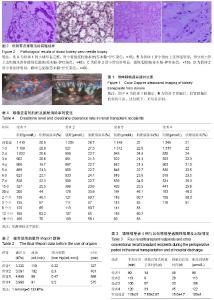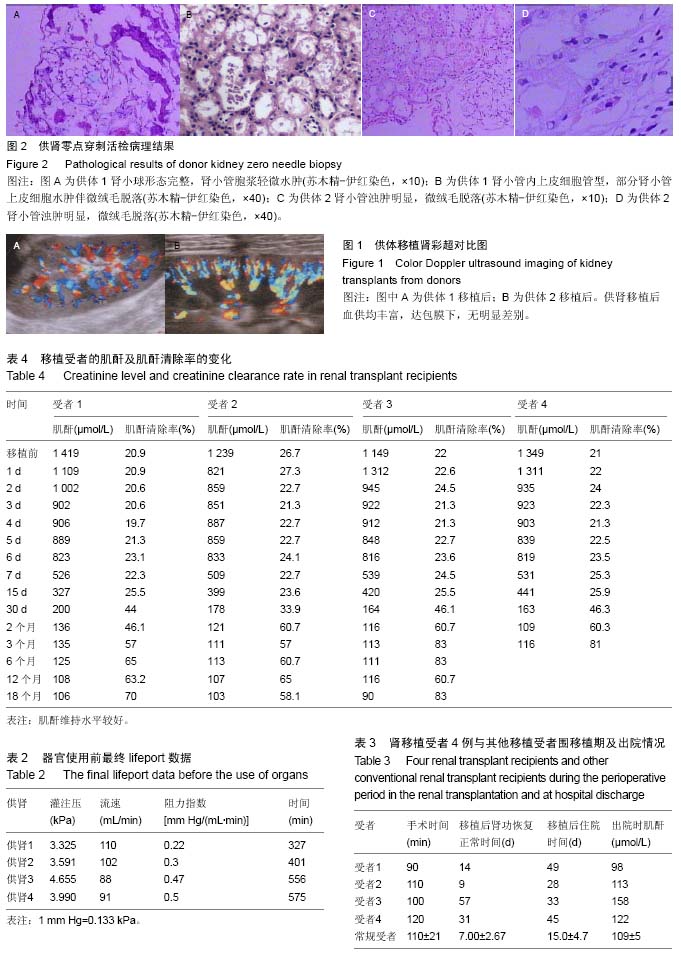| [1] Snoeijs MG, Schaubel DE, Hene R, et al. Kidneys from donors after cardiac death provide survival benefit.J Am Soc Nephrol.2010;21(6):1015-1021.
[2] Farney AC,Singh RP,Hines MH,et al.Experience in renal and extrarenal transplantation with donation after cardiac death donors with selective use of extracorporeal support. J Am Coll Surg.2008;206(5): 1028-1037, 1037.
[3] 石炳毅.中国公民逝世器官捐献肾移植的发展与进步[J]. 中华器官移植杂志, 2014, 35(10): 577-579.
[4] Le Dinh H, Weekers L, Bonvoisin C, et al. Delayed graft function does not harm the future of donation- after-cardiac death in kidney transplantation. Transplant Proc.2012;44(9): 2795-2802.
[5] Pine JK, Goldsmith PJ, Ridgway DM, et al.Comparable outcomes in donation after cardiac death and donation after brainstem death: a matched analysis of renal transplants. Transplant Proc.2010;42(10): 3947-3948.
[6] Monbaliu D,Pirenne J,Talbot D.Liver transplantation using Donation after Cardiac Death donors. J Hepatol. 2012;56(2): 474-485.
[7] Johnson RJ, Bradbury LL, Martin K, et al.Organ donation and transplantation in the UK-the last decade: a report from the UK national transplant registry. Transplantation.2014;97 Suppl 1: S1-S27.
[8] de Vries EE,Hoogland PE,Wind J,et al.Transplantation of kidneys from paediatric DCD donors: a comparison with DBD donors. Nephrol Dial Transplant.2013; 28(1): 220-226.
[9] 中华医学会器官移植学分会,中华医学会外科学分会移植学组,中国医师协会器官移植医师分会. 中国心脏死亡捐献器官评估与应用专家共识[J]. 中华移植杂志:电子版,2014,8(3):117-122.
[10] 董永逵,杨叶华,董永山.13例有机磷农药中毒合并急性肾衰的临床研究[J].医药前沿,2013,(19):152.
[11] 徐彬.400例口服有机磷农药中毒抢救分析[J].中国卫生标准管理, 2015,1(1):108-110.
[12] 姜秀国,伏圣高.急性有机磷中毒403例分析[J]. 中国医药指南, 2015,15(2):40-41.
[13] 刘春晓,韦真理,阮海林.急性肾损伤生物标志物在有机磷农药中毒时的研究进展[J]. 右江民族医学院学报, 2009, (3): 478-480.
[14] 刘学革,张震.急性重度有机磷农药中毒并发肾损害45例分析[J].中国实用乡村医生杂志,2012,19(11):48-49.
[15] 张可. NGAL与急性有机磷农药中毒急性肾损伤相关性研究[J]. 国际检验医学杂志,2012, 33(5): 532-534.
[16] 刘春晓,韦真理,阮海林.急性肾损伤生物标志物在有机磷农药中毒时的研究进展[J]. 右江民族医学院学报, 2009, 31(3):478-480.
[17] 庄清武,刘利青.急性有机磷农药中毒对肾脏的影响[J]. 医师进修杂志, 2005,28(17): 40-41.
[18] Wang C, Liu L, Fu Q, et al. Kidney transplantation from donors after brain or cardiac death in China--a clinical analysis of 94 cases.Transplant Proc.2013; 45(4): 1323-1326.
[19] 容松.肾移植后急性排斥反应及免疫抑制剂的应用[J].中国组织工程研究, 2012,16(40):7564-7571.
[20] 徐莹,王仁定,吴建永,等.肾移植后急性排斥反应发生相关术前因素分析[J].中华移植杂志:电子版,2010,(1): 30-33.
[21] 孙小齐. 肾移植受者与肝移植受者术后肺部感染的临床研究[D]. 南方医科大学, 2013. |

